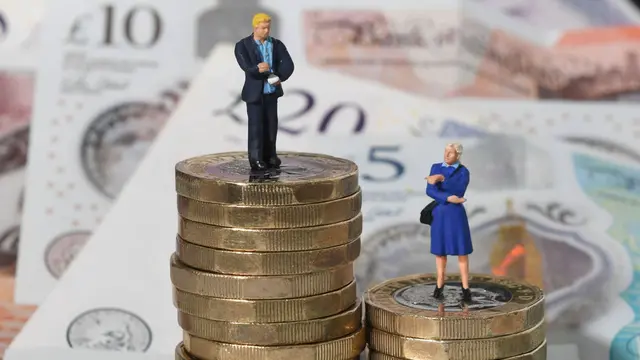Parity for women in most areas of public life appears to be decades away, according to new research.
Men still dominate every sector of politics, public life and business, according to a new report by the Fawcett Society with the under-representation of women "consistent and persistent across sectors".
"Based on current rates of progress we're looking at generations. We're generations away from achieving gender equality particularly at the top of business and public life and that's fundamentally unacceptable," says Sam Smethers, chief executive of the Fawcett Society.
"So we're arguing we need to pace of change with real interventions that will make a difference."
The UK's largest companies have been obliged to publish their gender pay gap figures since 2017 but since then there has been negligible progress.
Last year the gap closed from just 17.8% to 17.3% across all employees and in the majority of industries the gap actually grew. The data compares the average earnings across an organisation and it's significantly impacted by having fewer women in senior roles than men.
The new report, Sex and Power 2020, reveals women make up just over one in 20 CEOs of FTSE 100 companies at 6%.
In education just over a third of women are secondary headteachers at 39%. The figure has risen by just 6% since 2005.
Women make up around a quarter of those in senior positions in the judiciary - but this falls to 17% for the Supreme Court with just two out of the 12 judges female.
Nikki Alderson was a criminal barrister in Bradford for 19 years. During her career she worked on complex murder trials, rape cases and even represented defendants in Jamaica on death row.
But she found it challenging returning to work after having children and remembers the moment when she had to say no and quit her job.
"I was seven-and-a-half months pregnant with my third child, my husband was working away in London," she says.
"On a Wednesday night I was asked by chambers to do a return case where it was a historic rape case with multiple complainants and it was due for retrial the following day.
"This case was going to be couriered to my house after hours... and the expectation was that I would read the whole of that brief and be trial ready for the following morning."
Ms Alderson gestures to signal the documents she was delivered to read overnight were roughly two feet high. She says it was an unrealistic task for anyone, but for a mother juggling two young children it was impossible.
She has since written a book called Raising The Bar and gives career coaching to women in the legal profession, but says without systemic and cultural change women will continue to leave mid-career.
"Women actually do 60% more of the domestic chores than men, and until we have men and women equally engaged in the debate both in terms of childcare responsibilities shared equally and also equal value within the workplace I think we're always going to have a struggle on our hands."
There are some shoots of progress. In the recent election a record number of women were elected to the House of Commons and it's the most diverse parliament to date.
Women now make up 34% of MPs, up from 32% in 2017. Women of colour make up 17% of MPs which reflects the population as a whole. But these statistics buck the national picture with women of colour simply missing at senior levels in many sectors.
Sky News went to meet new recruits at Greater Manchester Police where the most recent cohort was the largest single female appointment in its history at 43%. Despite this progress, last year the organisation's gender pay gap grew from 86p to 84p for women compared to every £1 earned by men.
Shanaz Aslam is now five weeks into her two-year training as a police officer. It's the job she's wanted to do since a child and she wasn't deterred by a lack of female role models.
"When I was growing up all the girls went into hairdressing and the likes of midwifery and all the boys went into mechanics and law," she says.
"A lot of family and friends have been surprised that I'm joining the police because a lot of people do still see it as a male-dominated career."
Chief Inspector Tony Alogba from the Positive Action team stated: "Here at GMP we are so pleased to be able to welcome so many female officers to the force. GMP is working hard to recruit officers that are reflective of the communities we serve and welcome the increased interest from females of all backgrounds. I wish everyone who has attested a successful career with GMP."
(SKYNEWS)
 简体中文
简体中文

